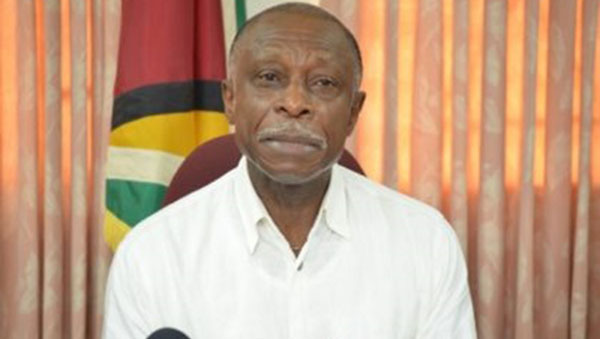GEORGETOWN, Guyana, September 11, 2018 (CMC) – The Guyana government, yesterday, defended its decision to sign a Memorandum of Understanding (MOU) with Trinidad and Tobago, later this week, even as the business community called on it to delay the signing.
Foreign Affairs Minister, Carl Greendige, said the Framework Agreement and the MOU will be signed between the two countries, and downplayed calls by the Georgetown Chamber of Commerce and Industry (GCCI) to delay the signing until Guyana puts in place, legislation regarding its oil industry.
Last week, the GCCI said it had submitted a model local-content legislation to the David Granger government and called on it to delay the signing of the MOU, which could pave the way for Trinidadian companies to gain better access to doing business in the Caribbean Community (CARICOM) country.
“We want Guyanese to have first consideration in the procurement of goods and services. We hope that the government hears our cry,” GCCI president, Deodat Indar, told reporters.
Trinidad and Tobago Prime Minister, Dr. Keith Rowley, said that the agreement will be signed here, tomorrow, and Indar said that the “model legislation” was necessary to safeguard the rights of Guyanese businesses, at a time when the country is on the verge of becoming an oil-producing nation.
But Greenidge said that it appears that some persons, here, including those in the media, were misinterpreting what exactly is a MOU.
“An MOU and, I emphasize, because it seems that the press and those who ought to know better are imbuing MOUs with some magic they do not have. And MOUs are normally statements of intent that is signed between two countries, usually at the level of foreign ministers, but it could be at other levels.”
Greenidge said that the memorandums are merely statements that show that governments will collaborate on general trade matters, to establish a platform, at which cooperation will be undertaken.
He said the MOU is not binding, but will be followed by other “more concrete” documents like the Framework Agreement that establishes what both countries will be bringing to the table.
He insisted that the MOU was not designed to save the state owned oil company, PETROTRIN, in Trinidad and Tobago and that Georgetown does not have any intention to do so.
“The MOU, in relation to Trinidad and Tobago and the Framework Agreement, are no different from any of the others. As a matter of fact… we have indicated before, in 1999; the governments of those two countries signed an MOU.
“It was a 10 year MOU. It was signed and no riot occurred, no sector was destroyed, there was no apocalypse. And I am sure that this won’t happen on this occasion either,” Greenidge said.
Meanwhile, Greenidge has confirmed that the closure of the oil refinery at PETROTRIN has led to Guyana and other CARICOM countries seeking to acquire the commodity from extra-regional markets.
“The Caribbean prime ministerial sub-committee (held in Barbados last week) looked at this matter and examined a couple of options that were available, and they asked the relevant experts and ministers to explore the matter urgently, and to advise,” he told reporters.
Greenidge said that CARICOM was on the verge of abolishing the 40 percent Common External Tariff (CET) in order to avoid a spike in fuel prices at the pumps.
“There is a recognition that the barriers to importation, from elsewhere, is partly a fiscal barrier. In other words, it arises from the CET and the ministers agreed that, in the circumstances, the Common External Tariff will have to be waived and the other sources will be explored,” he said.
Greenidge said that as far as fuel sources are concerned, regional governments were considering purchasing from the United States or fuel storage facilities in Antigua and Jamaica.
Greenidge said CARICOM leaders have been mandated to deal with the supply of fuels with “urgency”. “No time frame was set. Urgency was required, so I don’t think it was necessary. They just know they have to come back, quickly. There is not to be a delay arising from what would normally be required, namely COTED (Council for Trade and Economic Development) and CET. That would not be a constraint,” he said.
 Pride News Canada's Leader In African Canadian & Caribbean News, Views & Lifestyle
Pride News Canada's Leader In African Canadian & Caribbean News, Views & Lifestyle





